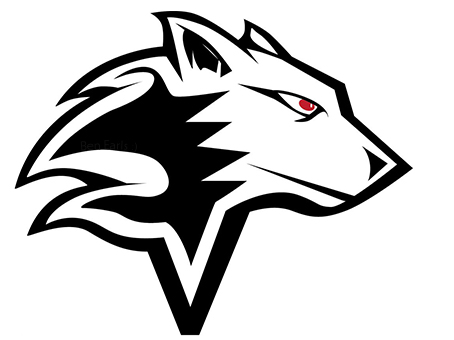
School Profile 2024-25
Opportunities
Withdrawing from a Course
If a student (including a student with a completed Individual Education Plan) withdraws from a Grade 11 or 12 course within five instructional days following the issue of the first provincial report card in a semestered or non-semestered school, the withdrawal is not recorded on the Ontario Student Transcript (OST).
If a student withdraws from a course after five instructional days following the issue of the first provincial report card in a semestered or non-semestered school, the withdrawal is recorded on the OST by entering a ‘W’ in the ‘Credit’ column. The student’s percentage grade at the time of the withdrawal is recorded in the ‘Percentage Grade’ column.
Credit Recovery
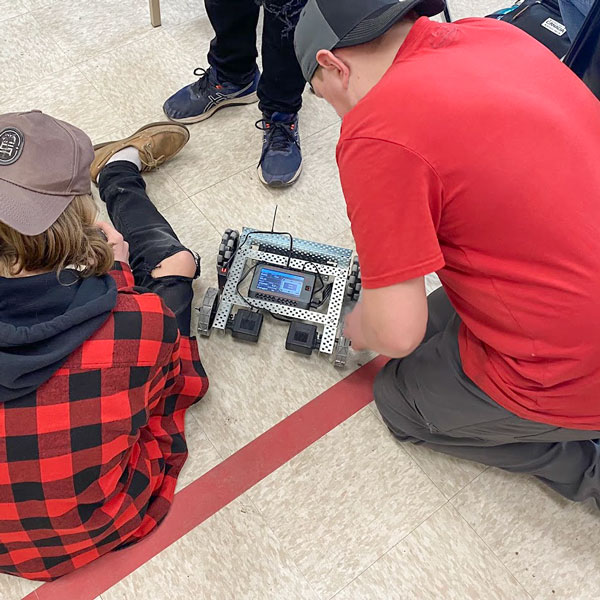
Credit Recovery offers students a supportive environment that focuses on the key expectations of a course and also assists students with pathway planning and developing improved learning skills that will help them in earning their Ontario Secondary School Diploma.
DELF
The DELF (diplôme d’études en langue française, or French language studies diploma) is an internationally-recognized certification of proficiency in French for non-francophones. DELF exams take place in 175 countries worldwide. There are six separate diplomas possible, based on the six levels of the Common European Framework of Reference for Languages (CEFR): A1 and A2 (basic user), B1 and B2 (independent user), and C1 and C2 (proficient user).
In Ontario, Grade 12 Core, Extended, and Immersion FSL (French as a Second Language) students have the opportunity to challenge one of the following three exams, under the guidance of their French teacher: A2, B1, or B2. French language skills are evaluated in the four areas of oral comprehension, oral expression, written comprehension, and written expression. Obtaining DELF certification not only opens doors to post-secondary and employment opportunities, it also serves as an official, internationally-recognized testament to a student’s language learning journey and accomplishments. Grand Erie encourages its students in all FSL pathways to challenge the DELF in their Grade 12 year.
Dual Credits
Grand Erie District School Board has partnered with Conestoga College, Fanshawe College and Mohawk College to allow students to earn college credits before they graduate secondary school. These credits are delivered in three different ways within the Board:
School Within a College (SWAC)
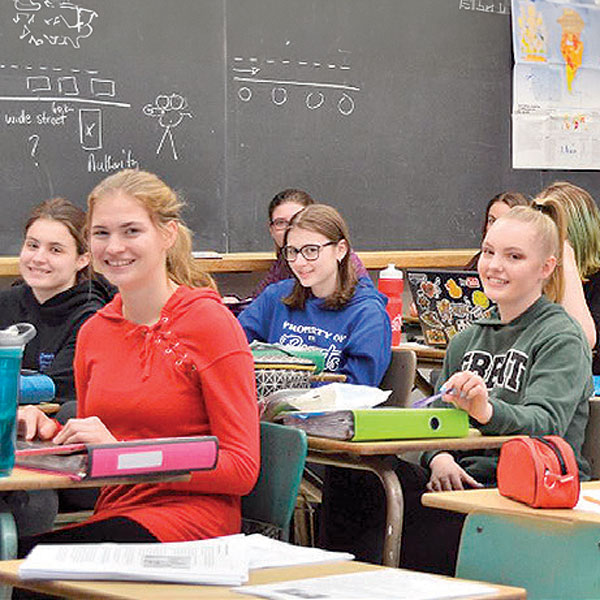
Team Taught
Is taught in combination with a college instructor and secondary school teacher during a student’s regularly scheduled class.
After School
Is taught by a college instructor (and supported by a secondary school teacher) after school in one of the local secondary schools. Students from other schools are welcome to enrol. Speak with your guidance counsellor for further information.
eLearning
Grand Erie offers access to a variety of courses (9-12) through eLearning, which features entirely online learning through the Brightspace platform. The teacher may be from a school in Grand Erie District School Board or from another school board in Ontario. In eLearning courses, students will not have an assigned classroom or live taught lessons at a specific time in the day, but will instead navigate the learning and assignments on their own asynchronously with the digital support of their teacher.
Students enrolled in eLearning courses are required to attend and engage in their eLearning courses regularly and consistently, just as they do for face-to-face classes. Grand Erie students will have access to a device within their home school during their eLearning period so that they can work on their course during the regular school day. eLearning courses can be selected during the course selection process on myBlueprint or through home school guidance councillors.
Grand Erie Learning Alternatives (GELA)

Scheduled day programs, booklet and e-Learning are available.
For more information, contact your school’s Guidance Counsellor.

Summer School
Grand Erie District School Board will be offering summer school for grades 9 - 12 credits during the month of July. Locations will be sent to each school in the spring. For additional information call 519-753-6079.
Indigenous Education Advisory Committee (IEAC)
IEAC is an advisory committee mandated by the Ministry of Education in September of 2017. The mandate of the committee is to enhance and improve Indigenous Education for all students. The committee reports to the board on the Board Action Plan and programming for both Elementary and Secondary panels. The committee is comprised of board personnel, community members and organizations with an interest in Indigenous Education, including parents.
myBlueprint

As part of our commitment to Career Education and supporting the ministry mandate for Creating Pathways to Success, we have moved forward with a board license of the myBlueprint Education Planner. Our license provides access to all students 7-12, their families, and all 7-12 staff in Grand Erie.
myBlueprint has been supporting Ontario school boards for 13+ years. The service supports teachers, empowers students, and engages parents with their child’s education, career, and life planning. Accessible via the website on any browser, myBlueprint captures current progress in the classroom and offers a complete representation of a child’s unique pathway.
myBlueprint’s Education Planner is mobile-friendly, and ever-evolving to support the needs of Grand Erie students. The program allows students to view their graduation requirements and over 12,000 post-secondary programs across the country based on their Ontario specific courses.
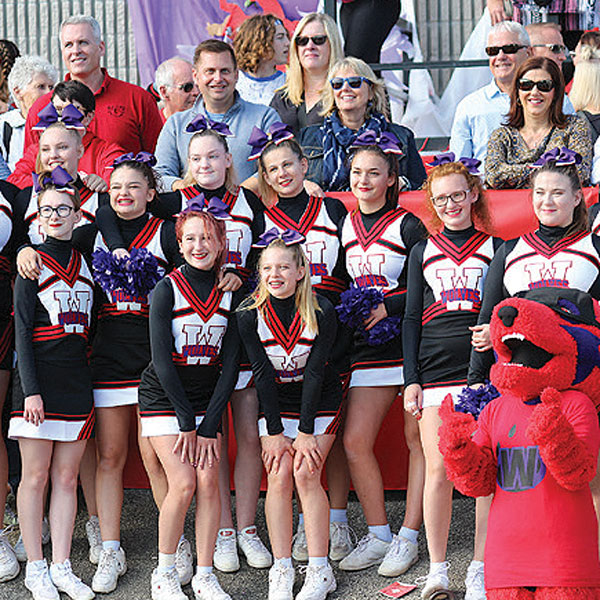
Ontario Student Record (OSR)
The OSR is the official, on-going educational record for each student and is stored in the school most recently attended by the student. Teaching staff, each student, and the parent(s) or guardian(s) of a student are entitled to have access to the student’s OSR. Supervised access can be arranged by appointment during normal business hours. Transcripts of marks are issued on written or personal request.
Once a student reaches the age of 18, by law, they control access to the OSR by anyone not mentioned above. Parents of adult students will only have access to a student’s academic records upon written authorization from the student. All senior level courses remaining on a student’s timetable five days after the first provincial report will be recorded on the transcript.
Transcripts requested after a student has graduated and is no longer attending secondary school are subject to a charge of $5.00 per copy.
Prior Learning Assessment and Recognition (PLAR)
PLAR is the formal evaluation and credit-granting process whereby students may obtain credits for prior learning. Prior learning includes the knowledge and skills that students have acquired, in both formal and informal ways, outside secondary school. Students may have their knowledge and skills evaluated against the expectations outlined in provincial curriculum policy documents in order to earn credits toward the secondary school diploma. The PLAR process involves two components: “equivalency” and “challenge”.
Special Education Advisory Committee (SEAC)
SEAC is an advisory committee mandated through the Education Act as a standing committee of each school Board. The committee reports to the school Board and makes recommendations to the board on special education programs and services. The committee is comprised of Trustees, Board personnel, community members, and associations representing a wide variety of interests related to students with exceptional needs.
Specialist High Skills Major (SHSM)
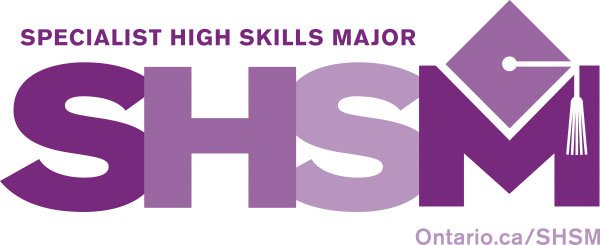
Students enrolled in a SHSM program are required to complete a bundle of classroom courses, workplace experiences and sector certifications to receive a special designation on their Ontario Secondary School Diploma (OSSD).
Participation in an SHSM program can help students prepare for apprenticeships, college, university or transition to work.
Grand Erie District School Board has programs in the following sectors:
- Agriculture
- Arts & Culture – Performance and Production, Journalism and Media
- Construction
- Environment
- Health & Wellness – Fitness, Healthy Living, Health Care, Hairstyling
- Horticulture & Landscaping
- Hospitality & Tourism
- Information & Communications Technology
- Manufacturing
- Sports
- Transportation
Special Education (Specialized Services)

Each one of Grand Erie’s Secondary schools has a Special Education department with Learning Resource teachers that can support the development and implementation of Individual Education Plans. Some of our schools have Self-Contained programs to support the learning needs of individual students for which the most enabling environment for them to meet their program goals is in a smaller class setting with higher staff to student ratio. In addition, system Student Support Services are available to support students and programming in the areas of Speech and Language Services, Psychological Services, Social Services and Behavioural Services.

